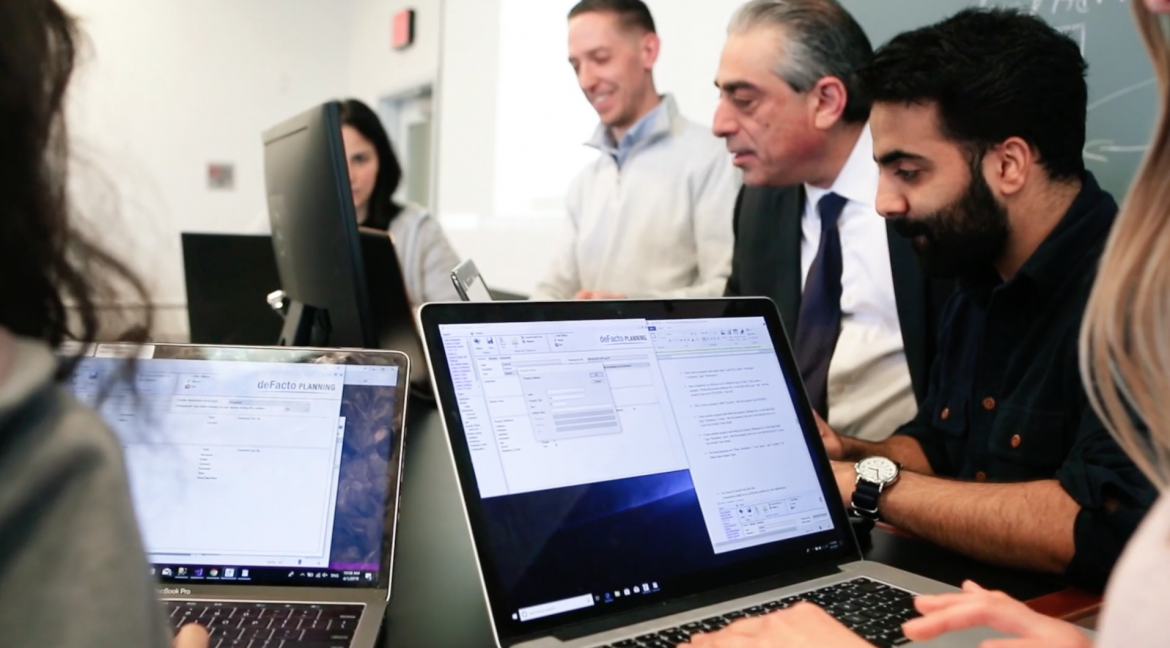
deFacto Planning in the Classroom | An Interview with RPI Professor Dr. Pindaro Demertzoglou
deFacto Planning In The Classroom – an interview with Dr. Pindaro Demertzoglou
Recently, I was lucky enough to be invited into the classroom of Dr. Pindaro Demertzoglou, professor of Data Resource Management at the Rensselaer Polytechnic Institute’s Lally School of Management. After taking the opportunity to observe Pindaro interact with his students during a class, he was gracious enough to sit down and talk with me about his field and how using deFacto Planning in the classroom as a teaching tool has been a great success.
How did you come to teach this subject?
It is what I love. When I took over this class, it was a different class. We spent a lot of time to bring that class up to the modern demands of the analytics market. That’s how the class has evolved, and we continue to evolve all the time.
Why is this subject important to you and your students?
The skills they get in this class are not because I want to teach them. This is what the market needs. This is what my connections in the market are telling me and this is what all the articles are mentioning. SQL* for example, is one of the basic technologies that we use, and we use those skills working with deFacto servers. The students work directly with the back end of deFacto Planning. SQL skills are the number one technology desired by corporations in the market.
*SQL stands for Structured Query Language. deFacto uses Microsoft’s SQL Server in the back end of the product, and it is used for certain functions in the construction of the deFacto Planning product.
When your students leave this class, what skills do they walk away with?
They walk away practically with the skills to be able not only to take a piece of data and analyze it, but they are able to put together pieces of data from multiple heterogeneous data sources which they might need to connect, and bring together, clean it, scrub it, unify it- which is a long process. Then we go ahead and give them the perspective of thinking what kind of technology they’re supposed to use to analyze that data. Sometimes they might need to develop a data warehouse, sometimes they may just need to work with SQL, sometimes only Excel will do. So, it’s not the class that’s “technical”, it’s a consulting business class.
How were you first made aware of deFacto Planning?
I was aware when I got together with Craig DeBono, one of my best former students and Bob Bedard, the CEO of deFacto Global. Bob and Craig proposed a relationship between deFacto and RPI. Using deFacto Planning in the classroom is amazingly beneficial for our students for multiple reasons. One is they get exposed to the tools of deFacto and see how they line up and differ from what we use in class in terms of the basic functions (the business intelligence tools). Then very importantly, at the end of the semester, the students can put on their resume that they worked with deFacto tools, which is amazing for them.
“I believe that tools like deFacto-with the ease of use, the practicality and the applicability-will become very popular in the market to the point where it will become a necessity for everybody.”
How do you integrate deFacto Planning into your course?
In this class we have a SQL lab, and we do it by using the SQL server. Once they know how to work with that, they go to deFacto and their homework can be done on a remote deFacto database service-which is another way for them to learn how to work with a remote tool in the market.
What sets deFacto apart from other similar products on the market?
First of all, the ease of use and connectivity with Craig and Bob, who are always there for us. But, it’s not just the approach of the company which is so friendly, it is also the tool itself. It works, its easy and its practical. We have been using it for two semesters now and its applicable, so we will continue using it.
How to you visualize this field in 5 to 10 years for your students going on to become professionals?
I believe that tools like deFacto-with the ease of use, the practicality and the applicability-will become very popular in the market to the point where it will become a necessity for everybody. For anybody in business. It’s like in the 80’s with computers. You would distinguish who was the “computer guy” from a regular employee. We cannot say that today. Everyone has to have the ability to use a computer. So, I feel it is the same for software suites like deFacto. The skills the students are learning now will eventually simply be a requirement.
“With deFacto, they know what they can set up, they know the business intelligence infrastructure they can build, and how that infrastructure can help the company.”
How does using deFacto let the students take their raw knowledge and apply it to real world software?
They learn the raw skills here, and then deFacto kind of wraps it all together. One of the big benefits of deFacto is that the students learn the software, but through the software, they develop problem solving skills which are number one in demand in the market. Without deFacto, how can they become problem solvers if they don’t know how it is being done? With deFacto, they know what they can set up, they know the business intelligence infrastructure they can build, and how that infrastructure can help the company. They can use the appropriate components of deFacto Planning in the classroom to solve the particular corporate problem for that company because business analytics is very specific and situational. The solution has to be specific to the company at that time. There is no way to become a problem solver without knowing what you can do in a practical way.
Dr. Pindaro Demertzoglou has been in field of Data Analytics since a summer internship at the American College of Greece for the school library in 1993. He has been teaching at RPI for 20 years and has been teaching Data Resource Management since 2012.
-Leah Demo
To learn more about how deFacto can help your organization excel – click HERE to schedule a demo.
